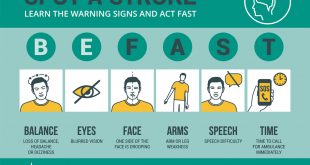By Dr. Drew Hall


What is vertigo?
Vertigo is a sensation of feeling off balance. If you have dizzy spells, you might feel like you are spinning or that the world around you is spinning. Dizziness is an altered sense of balance that can make you feel unsteady or lightheaded. In contrast, vertigo is a false sense of motion that you may experience while sitting, standing or even lying still.
Causes of Vertigo
Vertigo is often caused by an inner ear problem. Some of the most common causes include:
BPPV (benign paroxysmal positional vertigo) BPPV occurs when tiny calcium particles are dislodged from their normal location and collect in the inner ear. The inner ear sends signals to the brain about head and body movements relative to gravity. It helps you keep your balance. BPPV can occur for no known reason and may be associated with age.
Meniere’s disease. This is an inner ear disorder thought to be caused by a buildup of fluid and changing pressure in the ear. It can cause episodes of vertigo along with ringing in the ears (tinnitus) and hearing loss.
Vestibular neuritis or labyrinthitis. This is an inner ear problem usually related to infection (usually viral). The infection causes inflammation in the inner ear around nerves that are important for helping the body sense balance.
Vertigo may also be associated with:
• Head or neck injury
• Brain problems such as stroke or tumor
• Certain medications that cause ear damage
• Migraine headaches
Symptoms of vertigo
People with vertigo typically describe it as feeling like they are:
• Spinning
• Tilting
• Swaying
• Unbalanced
• Pulled to one direction
Other symptoms that may accompany vertigo include:
• Feeling nauseated
• Vomiting
• Abnormal or jerking eye movements (nystagmus)
• Headache
What is Meniere’s Disease?
Meniere’s disease is a disorder of the inner ear that can lead to dizzy spells (vertigo) and hearing loss. In most cases, Meniere’s disease affects only one ear. It can occur at any age, but it usually starts between early to middle adulthood. It’s considered a chronic condition, but various treatments can help relieve symptoms and minimize the long-term impact on your life.
Causes of Meniere’s disease
The cause of Meniere’s disease is unknown. Symptoms of Meniere’s disease appear to be the result of an abnormal amount of fluid (endolymph) in the inner ear, but it isn’t clear what causes that to happen.
Factors that affect the fluid, which might contribute to Meniere’s disease, include:
• Improper fluid drainage, perhaps because of a blockage or anatomic abnormality
• Abnormal immune response
• Viral infection
• Genetic predisposition
Because no single cause has been identified, it’s likely that Meniere’s disease results from a combination of factors.
Symptoms of Meniere’s disease
Signs and symptoms of Meniere’s disease include:
• Recurring episodes of vertigo. You have a spinning sensation that starts and stops spontaneously. Episodes of vertigo occur without warning and usually last 20 minutes to several hours, but not more than 24 hours. Severe vertigo can cause nausea.
• Hearing loss. Hearing loss in Meniere’s disease may come and go, particularly early on. Eventually, most people have some permanent hearing loss.
• Ringing in the ear (tinnitus). Tinnitus is the perception of a ringing, buzzing, roaring, whistling or hissing sound in your ear.
• Feeling of fullness in the ear. People with Meniere’s disease often feel pressure in an affected ear (aural fullness).1
After an episode, signs and symptoms improve and might disappear entirely for a while. Over time, the frequency of episodes may lessen.
If you’re looking for reliable vertigo treatment or relief from Meniere’s disease symptoms, visit Dr. Drew Hall at Sarasota Upper Cervical Chiropractic. Visit Dr. Hall to get to the root cause of your vertigo. In their office they take 3D cone beam computed tomography (CBCT) that allows the doctor to view the neck and joints that may be misaligned causing your vertigo. Don’t guess at the cause of your problems.
Schedule a no obligation FREE consultation in our office today!
1. Meniere’s disease (2020) Mayo Clinic. Mayo Foundation for Medical Education and Research. Available at:
https://www.mayoclinic.org/diseases-conditions/menieres-disease/symptoms-causes/syc-20374910.
Sarasota Upper Cervical Chiropractic
941.259.1891
sarasotauppercervical.com
 Southwest Florida's Health and Wellness Magazine Health and Wellness Articles
Southwest Florida's Health and Wellness Magazine Health and Wellness Articles

